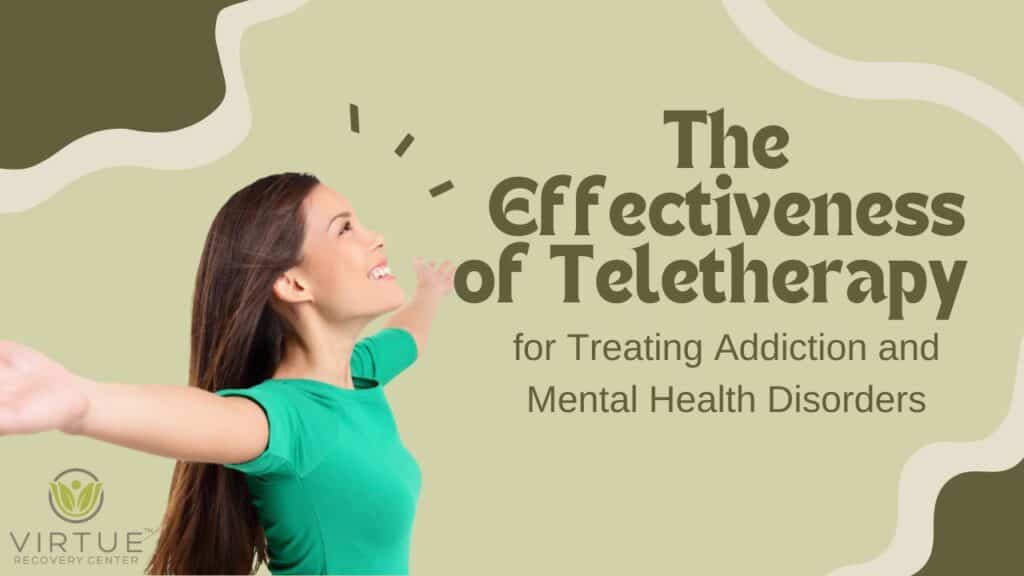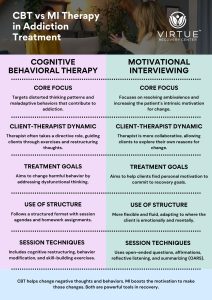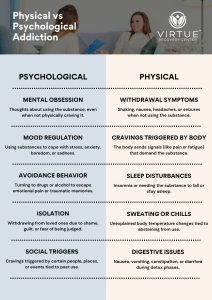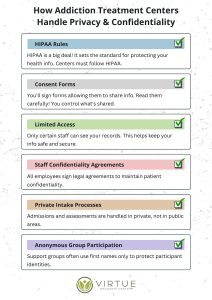Did you know that teletherapy has emerged as an effective approach to treating addiction and mental health disorders? With the help of remote communication technologies, individuals can now access therapy and support from the comfort of their own homes. This method offers flexibility, accessibility, and convenience, making it an increasingly popular choice for addiction recovery. In fact, studies have shown that teletherapy can be just as effective as in-person therapy in treating substance abuse and addressing underlying mental health issues.
Key Takeaways:
- Teletherapy offers flexibility, accessibility, and convenience for individuals seeking addiction recovery.
- Studies have shown that teletherapy is just as effective as in-person therapy in treating substance abuse and underlying mental health issues.
- Remote communication technologies allow individuals to access therapy and support from the comfort of their own homes.
- Teletherapy eliminates barriers such as transportation and geographical limitations, ensuring individuals can access the care they need.
- Virtual addiction treatment offers a range of therapeutic options, such as online therapy sessions and remote addiction counseling services.
The Benefits of Teletherapy for Addiction Treatment
Teletherapy offers several key benefits for addiction treatment. Online therapy for addiction provides a safe and confidential space for individuals to discuss their struggles and receive support. Remote addiction counseling allows individuals to connect with licensed therapists and addiction specialists without the need for in-person appointments. Telehealth services for addiction treatment also eliminate barriers such as transportation and geographical limitations, ensuring that individuals can access the care they need regardless of their location.
One of the significant benefits of online therapy for addiction is the convenience and accessibility it provides. Individuals can engage in therapy sessions from the comfort of their own homes, eliminating the need for travel and allowing for greater flexibility in scheduling appointments. This convenience is especially beneficial for individuals who may have limited transportation options or live in rural areas without easy access to addiction treatment centers.
Additionally, remote addiction counseling offers a higher level of privacy and discretion. Some individuals may feel more comfortable discussing their addiction struggles in the privacy of their own homes and find it easier to open up during online therapy sessions. This increased sense of security enables individuals to be more open and honest, facilitating a more productive therapeutic process.
Teletherapy also overcomes geographical barriers, enabling individuals to access addiction treatment regardless of their location. Whether someone lives in a remote area or struggles with mobility issues, telehealth services for addiction treatment make it possible for individuals to receive the care they need without the limitations imposed by distance. This expanded access to addiction treatment can be life-changing for individuals who would otherwise face significant challenges in accessing appropriate care.
Furthermore, online therapy for addiction allows individuals to connect with licensed therapists and addiction specialists who may not be available in their local area. This opens up a broader range of treatment options and expertise, ensuring that individuals receive evidence-based and specialized care tailored to their unique needs.
Overall, teletherapy offers a range of benefits for addiction treatment, including increased accessibility, convenience, privacy, and access to expert care. Through online therapy for addiction, remote addiction counseling, and telehealth services for addiction treatment, individuals can overcome barriers that may have previously hindered their recovery journey.
| Benefits of Teletherapy for Addiction Treatment |
|---|
| Provide a safe and confidential space |
| Eliminates transportation and geographical limitations |
| Offers convenience and flexibility in scheduling |
| Increases privacy and discretion |
| Expands access to specialized care |
The Rise of Virtual Rehab Programs
Virtual rehab programs have become increasingly popular in recent years, offering a convenient and effective way to provide comprehensive addiction treatment in a remote setting. These programs utilize remote communication technologies to deliver a range of services, including individual therapy, group counseling, psychoeducation, and support groups. With the rise of virtual rehab programs, individuals can now access the necessary treatment and support from the comfort of their own homes.
One of the key components of virtual rehab programs is the availability of online support for addiction recovery. Through virtual platforms, individuals can connect with a supportive community that understands their struggles and helps them stay motivated and accountable on their recovery journey. This online support plays a crucial role in creating a sense of belonging and connection, even in a digital environment.
Virtual rehab programs are designed to incorporate evidence-based practices and therapies that address the unique challenges of addiction. By utilizing digital tools and platforms, these programs can offer innovative approaches tailored to the individual’s needs. Whether it’s individual therapy sessions conducted through video calls or online support groups, virtual rehab programs ensure that individuals receive the necessary treatment to overcome their addiction.
The benefits of virtual rehab programs are not limited to accessibility and convenience. These programs also provide individuals with a safe and confidential space to receive treatment, free from the potential stigma associated with attending in-person programs. The virtual nature of these programs also eliminates barriers such as transportation and geographical limitations, allowing individuals from any location to access the care they need.
Overall, the rise of virtual rehab programs has revolutionized the field of addiction treatment by providing a flexible and effective solution for individuals seeking recovery. The incorporation of online support for addiction recovery ensures that individuals have the necessary tools and resources to navigate their journey toward sobriety successfully.
| Benefits of Virtual Rehab Programs | Benefits of Online Support for Addiction Recovery |
|---|---|
|
|
Teletherapy for Addressing Co-occurring Disorders
Teletherapy is an effective approach for individuals with co-occurring disorders, where addiction is present alongside mental health issues such as depression, anxiety, or trauma. Through teletherapy addiction counseling, individuals can receive integrated treatment that addresses both their substance abuse and their mental health challenges.
This comprehensive approach helps individuals understand and manage the underlying issues contributing to their addiction, leading to more successful recovery outcomes. Teletherapy for addiction treatment allows individuals to access virtual counseling sessions and receive personalized support from licensed therapists, all from the comfort and convenience of their own homes.
The Benefits of Teletherapy for Co-occurring Disorders
- Integrated treatment: Teletherapy offers integrated treatment for co-occurring disorders, addressing both addiction and mental health issues simultaneously.
- Convenience and accessibility: Individuals can access teletherapy addiction counseling from anywhere, eliminating the need for in-person appointments and reducing barriers such as transportation and geographical limitations.
- Flexibility: Teletherapy allows for flexible scheduling, making it easier for individuals to fit therapy sessions into their daily lives.
- Increased privacy: Teletherapy provides an added layer of privacy to individuals seeking treatment for co-occurring disorders, as therapy sessions can be conducted from the comfort and safety of their own homes.
Digital Resources for Co-occurring Disorders
In addition to teletherapy, there are various digital resources available to support individuals with co-occurring disorders:
- Mobile applications: There are several mobile applications that offer tools and resources to help individuals manage their addiction and mental health challenges.
- Online support groups: Virtual support groups provide individuals with a sense of community and connection, allowing them to share their experiences, challenges, and successes with others who can relate.
- Web-based resources: Websites and online platforms provide educational materials, self-help resources, and evidence-based practices to support individuals in their recovery journey.
By combining the convenience and accessibility of teletherapy addiction counseling with the support of digital resources, individuals with co-occurring disorders can receive comprehensive treatment that addresses their unique needs. This integrated approach increases the likelihood of successful recovery and long-term wellness.
Benefits of Teletherapy for Co-occurring Disorders
| Benefits | Description |
|---|---|
| Integrated treatment | Addresses both addiction and mental health issues simultaneously. |
| Convenience and accessibility | Eliminates geographical limitations and transportation barriers. |
| Flexibility | Allows for easy scheduling and fitting therapy sessions into daily life. |
| Increased privacy | Therapy sessions can be conducted from the comfort and safety of home. |
The Effectiveness of Remote Addiction Treatment
Remote addiction treatment has revolutionized the way individuals receive support on their recovery journey. With the advent of teletherapy and telehealth addiction support, individuals can access effective treatment options from the comfort of their own homes. Research has consistently shown the effectiveness of remote addiction treatment in improving outcomes and reducing the risk of relapse.
The Benefits of Remote Addiction Treatment
One of the key advantages of remote addiction treatment is its ability to reach individuals in any location. Geographical barriers and transportation issues often pose challenges for those seeking in-person treatment. With remote addiction treatment, individuals can access care regardless of their location, ensuring that no one is left behind.
Furthermore, remote addiction treatment offers increased privacy and discretion. Some individuals may feel uncomfortable attending in-person treatment programs due to the fear of judgment or stigma associated with addiction. Teletherapy and telehealth addiction support provide a confidential space for individuals to receive the care they need without feeling exposed or vulnerable.
Studies have shown that remote addiction treatment is just as effective as in-person treatment in addressing substance abuse and co-occurring mental health disorders. It has been found to significantly reduce substance use, improve mental health outcomes, and increase treatment engagement and retention rates. The convenience and accessibility of teletherapy and telehealth addiction support contribute to its effectiveness, allowing individuals to access help whenever they need it easily.
A Comparison: In-Person vs. Remote Addiction Treatment
To further highlight the effectiveness of remote addiction treatment, let’s compare it with in-person treatment in the table below:
| In-Person Treatment | Remote Addiction Treatment | |
|---|---|---|
| Accessibility | Limited by geographical location and transportation barriers | Accessible from any location, eliminating geographical limitations |
| Privacy | Potential fear of judgment or stigma associated with attending in-person programs | Confidential and discreet, ensuring privacy for individuals |
| Effectiveness | Proven to be effective in treating addiction, but may be less convenient for individuals with busy schedules | Equally effective in reducing substance use, improving mental health outcomes, and increasing treatment engagement and retention rates |
*Note: The table provides a concise comparison between in-person treatment and remote addiction treatment, highlighting the advantages of the latter.
Overall, remote addiction treatment offers a viable and effective alternative to traditional in-person treatment. Teletherapy and telehealth addiction support empower individuals to overcome addiction and achieve lasting recovery while providing the necessary care and assistance they need.
Accessing Digital Therapy for Addiction
Digital therapy for addiction offers a wide range of online resources and tools that can support individuals in their recovery journey. In addition to traditional therapy sessions, individuals can access web-based addiction therapy programs, mobile applications, and online support groups. These digital resources provide a variety of self-paced interventions, educational materials, and interactive exercises to help individuals develop coping skills, manage cravings, and stay connected to their recovery community.
Web-based addiction therapy programs offer convenience and flexibility, allowing individuals to access therapy sessions from the comfort of their own homes. These programs often provide evidence-based treatment approaches and can be tailored to meet individuals’ specific needs. Whether it’s cognitive-behavioral therapy, motivational interviewing, or other therapeutic modalities, digital therapy for addiction offers a range of options for individuals seeking support.
Mobile applications have become increasingly popular tools for addiction recovery. These apps provide features such as progress tracking, mindfulness exercises, and relapse prevention strategies. With just a few taps on their smartphones, individuals can access valuable resources to aid their recovery process anytime, anywhere.
Online support groups are an essential part of digital therapy for addiction. They offer individuals a supportive community that understands and relates to their struggles. These groups provide a safe space for sharing experiences, receiving encouragement, and gaining valuable insights from others who are also on the path to recovery.
Benefits of Digital Therapy for Addiction
1. Convenience and Accessibility: With web-based addiction therapy programs and mobile applications, individuals can access therapy and resources whenever it’s most convenient for them. This eliminates the need for frequent travel and allows individuals to fit their recovery efforts into their daily lives.
2. Privacy and Discretion: Digital therapy for addiction offers an extra layer of privacy, allowing individuals to seek help without the fear of being stigmatized. It provides a confidential space where individuals can explore their thoughts and emotions without judgment.
3. Additional Support: Digital therapy resources provide individuals with additional support outside of scheduled therapy sessions. It enables individuals to continue their recovery journey at their own pace and reinforce the skills they learn in therapy.
Overall, digital therapy for addiction opens up new possibilities for individuals seeking support in their recovery from addiction. It offers flexibility, accessibility, and a wide range of resources and tools to aid individuals in their journey toward a healthier and happier life.
Online Substance Abuse Treatment and its Benefits
Online substance abuse treatment provides individuals with a flexible and accessible option for addressing their addiction. With remote counseling for addiction recovery, individuals can receive support and guidance from trained professionals through videoconferencing or phone calls. This form of treatment offers convenience and eliminates potential barriers such as transportation, allowing individuals to fit therapy sessions into their schedule.
One of the key benefits of online substance abuse treatment is its ability to provide an additional layer of privacy. Many individuals may feel stigmatized or uncomfortable seeking in-person treatment, and remote counseling offers a safe space for them to address their addiction without judgment or scrutiny.
The Benefits of Online Substance Abuse Treatment:
- Flexibility: Online treatment allows individuals to attend therapy sessions from the comfort of their own homes, providing flexibility for those with busy schedules or mobility limitations.
- Accessibility: Remote counseling eliminates geographical limitations, ensuring that individuals can access the care they need regardless of their location. This is especially important for individuals living in rural areas with limited access to addiction treatment services.
- Convenience: With online substance abuse treatment, individuals can schedule therapy sessions at a time that works best for them, avoiding long wait times or conflicting appointments.
- Privacy: Remote counseling offers an added layer of privacy, allowing individuals to address their addiction in a comfortable and confidential environment.
Online substance abuse treatment has proven to be effective in helping individuals overcome addiction and achieve lasting recovery. It provides a convenient and accessible avenue for seeking help, ensuring that individuals can receive the support they need on their journey towards a healthier, addiction-free life.
Conclusion
Treating addiction with teletherapy has proven to be an effective and accessible approach for individuals seeking recovery. Virtual addiction treatment offers flexibility, convenience, and a wide range of therapeutic options to support individuals in overcoming their addiction and addressing underlying mental health issues.
While teletherapy has demonstrated effectiveness as a modality for addiction treatment, offering flexibility, convenience, and a broad spectrum of therapeutic options, it is crucial to acknowledge that its efficacy may not be uniform across all demographics and addiction types. Research indicates that remote addiction treatment can be highly effective for certain populations, such as individuals aged 18-45 years without alcohol or nicotine co-dependence.
However, these findings may not be generalizable to all age groups or those with different substance dependencies. Moreover, studies comparing telehealth with in-person treatment have found no significant differences in treatment retention, satisfaction, therapeutic alliance, or substance use outcomes, suggesting that teletherapy can be as effective as traditional methods. Yet, this does not discount the possibility that individual circumstances, such as the nature of the addiction, personal preferences, and specific mental health conditions, could influence the success of teletherapy for each person.
In light of these considerations, while teletherapy holds the promise to transform addiction treatment by increasing accessibility and providing personalized care, it is important to approach its application with an understanding of its potential variability in effectiveness. As the field continues to evolve, further research is needed to identify for whom and under what conditions teletherapy is most beneficial, ensuring that all individuals seeking recovery receive the most effective care possible.
Sources:
- National Center for Biotechnology Information. (2022). Mobile applications have become increasingly popular tools for addiction recovery. https://www.ncbi.nlm.nih.gov/pmc/articles/PMC9110036/
- American Psychiatric Association Publishing. (2021). The effectiveness of teletherapy for treating addiction and mental health disorders. https://ps.psychiatryonline.org/doi/10.1176/appi.ps.202100088
Q: What is teletherapy?
A: Teletherapy, also known as telehealth therapy, is the provision of therapy services through digital communication platforms such as video calls, phone calls, or chat services.
Q: How effective is teletherapy for treating substance use disorders?
A: Research has shown that teletherapy can be just as effective as in-person therapy for treating substance use disorders. It provides convenient access to treatment and support, especially for individuals who may have barriers to attending in-person sessions.
Q: What are the benefits of teletherapy for mental health treatment?
A: Teletherapy offers benefits such as increased accessibility to treatment, flexibility in scheduling, reduced stigma associated with seeking help, and the ability to receive therapy from the comfort of one’s own home.
Q: Can I receive teletherapy through my insurance provider?
A: Many insurance providers now offer teletherapy as part of their coverage. It’s important to check with your insurance provider to see if teletherapy services are included in your plan.
Q: What types of therapy services are available through teletherapy?
A: Teletherapy services can include individual counseling, group therapy, family therapy, and specialized treatment for substance use disorders and mental health conditions.
Q: How can I begin my telehealth journey for addiction treatment?
A: To begin your telehealth journey for addiction treatment, you can reach out to telehealth service providers or online addiction counseling services that offer teletherapy options. They can guide you through the process and help you get started on your treatment plan.
Q: What are the options for online addiction counseling through telehealth?
A: Online addiction counseling through telehealth can include cognitive behavioral therapy, talk therapy, recovery support, and access to telehealth addiction treatment programs tailored to individual needs.
Q: How does teletherapy support individuals struggling with substance use disorders?
A: Teletherapy provides support by offering accessible and convenient treatment options for individuals struggling with substance use disorders. It allows them to receive mental health counseling and recovery support from the comfort of their own environment.
Q: Is teletherapy a viable treatment option for individuals with mental health conditions?
A: Yes, teletherapy is a viable treatment option for individuals with mental health conditions. It allows them to access therapy services without the need to physically visit a therapist’s office, making treatment more accessible and convenient.
Can Teletherapy be an Effective Treatment Option for Men with Addiction and Mental Health Disorders?
Teletherapy can definitely be an effective treatment option for men with addiction and mental health disorders. Understanding the purpose of men’s rehab is crucial in providing targeted and effective therapy through digital platforms. It offers convenience and accessibility, allowing men to seek the help they need from the comfort of their own homes.
Q: What role does teletherapy play in the treatment of substance abuse and mental health disorders?
A: Teletherapy plays a crucial role in providing telehealth for addiction and mental health services. It offers access to therapy services, support, and treatment for individuals facing substance abuse and mental health challenges, especially during circumstances that limit in-person interactions.













